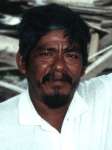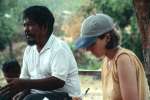|
|
||||
| Prev |
Guatemala 2000 A photo journal by David Booth |
Next | ||
|
|
||||
|
|
||||
| Prev |
Guatemala 2000 A photo journal by David Booth |
Next | ||
|
|
||||
In the afternoon we met again with Don Nicolas, Vice President of the Farmers' Cooperative, this time to learn more about Nuevo Mexico’s land problem. We had been hearing about it frequently for the past two days, and wanted to understand it more. The village of Nuevo Mexico was formed by returned refugees on land that was "sold" to them by the Guatemalan government under a loan that they are required to repay. But the villagers do not have the money to be able to pay for it. Furthermore, they do not feel that they should pay for it, because they were forced off of their own land years ago when they originally became refugees. But they cannot return to their own land because there are other people living there now, who also have nowhere else to go.

Don Nicolas, Vice President of the Farmer's Cooperative. |
The Land Commission is an organization of returned refugees who lived in Mexico for 13 years. We returned to Guatemala with the hope that we would have been given back the land that we owned prior to the war. After having accepted the fact that we cannot get that land back, we have been concentrating our efforts on owning the land in Nuevo Mexico. The government bought this land from private owners, and it was then “given” to the returned refugees for nine million quetzals of debt. [About $1 million USD.] For almost four years we have been fighting with the government to find a better solution because everyone in the community is worried about the debt and is afraid not to have anything to give to their children.

Don Nicolas speaks as Catherine takes translation notes. |
Many campesinos are losing all hope and want to go back to the refugee camps in Mexico. They know that they cannot possibly pay all that money to the government. At the most they could raise a quarter of the nine million quetzals -- a sum that they still consider unfair, since they did own land before and they have not been compensated for its loss.
A major problem is that the land is not very fertile and fertilizers cost a lot of money, money that they do not have. Furthermore, the crop that can generate the most income is coffee, while the ones that they need the most to sustain their families are corn and beans.
For the past few years, the Land Commission has also tried to raise its voice to the international community in order to receive some help or at least have their problems acknowledged. We realize that many other communities and countries are in even worse conditions than ours, but at least our reality should be known and not forgotten.
[End of meeting notes]